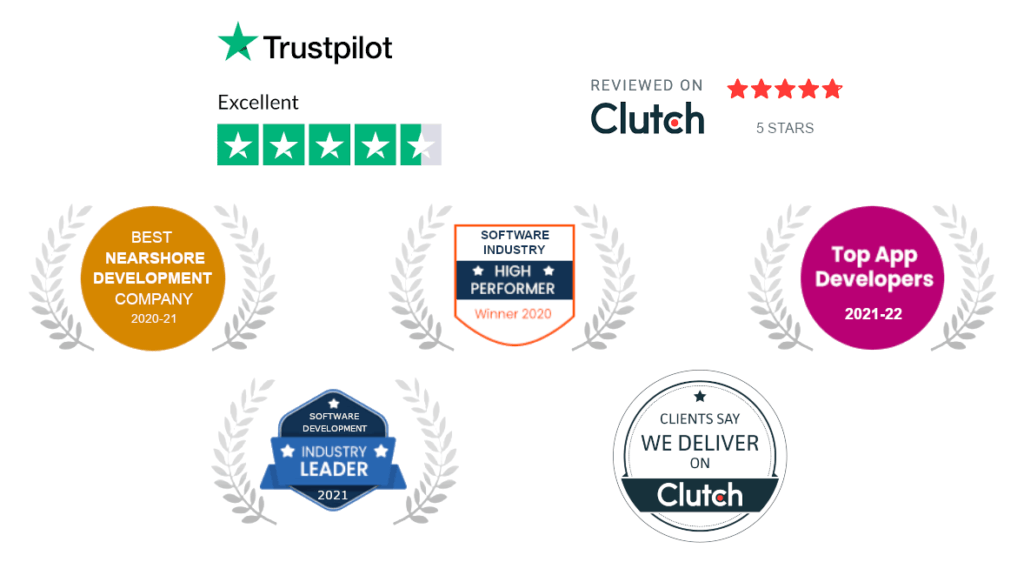We Help You Hire a Release Manager From South America
Your next project can often be stressful and time-consuming if you cannot find the right nearshore company to hire with. Smart, responsible, hardworking, and experienced Release Managers that are ideal candidates for your role.
Our AI matching algorithm helps your organization find the ideal development partner for your project. The method we use to match a Release Manager your team is a combination of data and personal interviews.
We are dedicated to helping you hire Release Managers who will contribute quality code right from the start. This is why we have refined our hiring processes over the past several years and have become a trusted partner for many startups that are growing rapidly. Add an expert to your team with OPSPROS and hire your future Release Manager.
Work to US Time
Our Release Managers work US hours and are happy to communicate with your existing team so they can gel with them.
Brazilian Rates
Our team is made up of talented and experienced Release Managers from Brazil who are eager to work with US companies.
No Employment Tax
Benefits, local employment taxes, and other employment-related expenses are handled by our company.
Tested Release Managers
It ensures your hiring a skilled professional who has passed our testing process when you hire a Release Manager from us.
Testimonials



Why Do You Need A Release Manager?

In software development, efficient and successful release management is crucial for delivering high-quality software products. A release manager plays a pivotal role in coordinating and overseeing the release process. They ensure smooth and timely releases while maintaining quality standards. Here’s why you need a release manager:
Planning and Coordination
A release manager is responsible for planning release cycles and coordinating activities across different teams, such as development, quality assurance, and operations. They establish release timelines, prioritize tasks, and manage dependencies, ensuring a well-structured and coordinated release process.
Risk Management
A release manager assesses and mitigates risks associated with software releases. They identify potential issues, such as compatibility problems or performance bottlenecks, and implement measures to minimize their impact. By addressing risks proactively, they reduce the chances of unexpected complications during releases.
Quality Assurance
The release manager collaborates with the quality assurance team to ensure that thorough testing is conducted before each release. They define release criteria, coordinate test plans, and ensure that all necessary quality checks are performed. This helps maintain high-quality standards and minimizes the risk of releasing defective software.
Communication and Stakeholder Management
A release manager acts as a central point of contact for all stakeholders involved in the release process. They communicate release plans, progress updates, and any changes or issues to relevant teams and stakeholders. They ensure transparency, alignment, and effective collaboration among all parties.
Release Documentation and Auditing
The release manager maintains comprehensive documentation of the release process, including release notes, version control, and configuration details. They ensure that proper documentation is available for reference and auditing purposes, facilitating future troubleshooting, compliance, and knowledge transfer.
The role of a release manager is vital in ensuring smooth, well-coordinated, and successful software releases. By planning and coordinating release activities, managing risks, maintaining quality standards, facilitating communication, and driving continuous improvement, release managers contribute significantly to the overall success of software development projects.
Difference between a Release Manager and DevOps Engineer?

As many people get confused between a Release Manager and a DevOps Engineer we thought we would clarify the differences.
Roles and Responsibilities
A Release Manager focuses specifically on the planning, coordination, and execution of software releases. They ensure a smooth and structured release process, manage dependencies, and prioritize tasks. Their role primarily revolves around release management activities. On the other hand, a DevOps Engineer has a broader scope, encompassing the entire software development and delivery lifecycle. They facilitate collaboration between development and operations teams, automate processes, and enable continuous integration and deployment. DevOps Engineers emphasize cultural and organizational aspects, promoting communication, collaboration, and agile practices.
Areas of Focus
A Release Manager’s primary focus is on release planning, coordination, risk management, and stakeholder communication. They ensure the timely and successful delivery of software releases. DevOps Engineers, on the other hand, focus on integrating development and operations, automating workflows, managing infrastructure, and promoting efficient collaboration between teams.
Skill Set and Expertise
Release Managers require strong organizational and coordination skills, along with a deep understanding of release processes, risk management, and quality assurance. They excel at stakeholder management and possess strong communication abilities. DevOps Engineers possess a broader skill set that includes knowledge of various tools, automation frameworks, infrastructure management, and CI/CD pipelines. They are adept at scripting, configuration management, and cloud technologies.
While both roles contribute to the successful delivery of software, Release Managers specialize in release management activities, while DevOps Engineers have a wider scope encompassing development and operations integration, automation, and continuous delivery practices.
- Increased Reliability of Release
- Improved Collaboration
- Enhanced Quality and Stability
- Increased Scalability
- Reduced Downtime
- Continuous Improvement
- Reduced Service Downtime
- Increased Customer Satisfaction

LUCAS GOMES
Release Manager
9+ Years of Release Management and 8+ Years of Linux Development. Has a wealth of web development expertise across many industries

MARCOS SANTOS
Release Manager
8+ Years of Release Managing 8+ Security Has worked in companies with large number of visitors and dealt with scaling problems.

BERNARDO OLIVEIRA
Release Manager
8+ Years of Release Management 9+ Infrastructure Engineer. Experienced senior Release Manager who enjoys a operations.
What does a Release Manager do?
A release manager is responsible for overseeing the planning, coordination, and execution of software releases. They ensure smooth and timely delivery of software products while maintaining quality standards. Their responsibilities include establishing release cycles, coordinating activities across teams, managing dependencies, and mitigating risks.
Release managers work closely with development, quality assurance, and operations teams to define release criteria, coordinate testing, and ensure thorough quality checks. They act as a central point of contact for stakeholders, providing communication, progress updates, and resolving issues.
Additionally, release managers maintain comprehensive release documentation and drive continuous improvement by analyzing the release process and implementing optimizations. Their role is critical in ensuring successful and well-coordinated software releases.


We Are A Solid Development Partner
OpsPros understands the importance of working with a reliable partner. As a result, we provide a premium and professional service to all our clients. Get in touch with us now to start your Platform development team!
How do you Hire a Release Manager?
Follow these three steps to hire a Release Manager:
Please click on the button below and click send on the form once you’ve written a description of your project and needs.
Interview Release Managers based on their resumes. Start shortlisting professionals you want to interview once proposals start coming in.
When you write your requirement description, you determine the scope of your work and the type of Release Manager you need.
In order to receive a fast and detailed response, please include the following information:
Detailed deliverables: From websites to APIs and big data analytics, list them all.
Identify whether the project is small or large in your job posting.
Let us know if you prefer experience with certain industries, software.
Billing: Please indicate your preference for hourly rates versus priced monthly contracts.
How much does it cost to Hire a Release Manager?
Several factors affect cost, including expertise, experience, market conditions, and location.
Additionally, an experienced Release Manager will provide higher-quality results, work faster, and have more specialized knowledge.
Once they gain experience, beginners might be able to price their services higher.
Below are the rates for hiring our South American Release Managers
Junior
Prices From- Works to U.S time zones
- No Recruitment Fees
- Vetted Skills & Experience
- Fulltime Working for you
- No Unreliable Freelancers
Intermediate
Prices From- Works to U.S time zones
- No Recruitment Fees
- Vetted Skills & Experience
- Fulltime Working for you
- No Unreliable Freelancers
Senior
Prices From- Works to U.S time zones
- No Recruitment Fees
- Vetted Skills & Experience
- Fulltime Working for you
- No Unreliable Freelancers
We have Release Managers in South America available for hire!
Depending on the exact skill requirements and experience requirements, the price of Engineers may vary slightly.
Depending on your project, you’ll need to determine which is right for you.
Do Release Managers write code?
While the primary focus of a Release Manager is on planning and coordinating software releases, their involvement in writing code may vary depending on the organization and specific requirements. While it is not a core aspect of their role, there may be instances where Release Managers write code to support their release management activities. Here are two examples:
Automation Scripts
Release Managers may write code in scripting languages like Python or PowerShell to automate certain release management tasks. For instance, they might develop scripts to generate release notes automatically by extracting relevant information from version control systems or build systems.
import subprocess
def generate_release_notes():
# Fetch commit history from version control system
commit_history = subprocess.check_output(['git', 'log', '--pretty=format:%s'])
# Generate release notes
release_notes = "Release Notes:\n" + commit_history.decode()
# Write release notes to file
with open('release_notes.txt', 'w') as file:
file.write(release_notes)
if __name__ == '__main__':
generate_release_notes()Deployment Configuration
Release Managers may also contribute to writing configuration files that define deployment settings for different environments. They may work with the development and operations teams to ensure the correct configuration parameters are set, such as database connection strings, API endpoints, or feature toggles.
# deployment.yaml
environment:
name: production
database:
connection_string: "jdbc:mysql://prod-db.example.com:3306/mydb"
api:
endpoint: "https://api.example.com"Interview Questions to ask when hiring a Release Manager
Can you describe your experience in designing and implementing scalable and resilient platforms?
This question allows the candidate to showcase their expertise in designing and building robust and scalable infrastructure platforms. Look for their knowledge of distributed systems, load balancing, fault tolerance, and their experience in implementing high-availability solutions.
How do you ensure security and compliance in platform design and operations?
This question assesses the candidate’s understanding of security best practices and their ability to implement security measures within a platform. Look for their knowledge of authentication, authorization, encryption, and their experience in ensuring compliance with industry standards and regulations.

Can you explain your approach to monitoring and troubleshooting platform performance?
This question evaluates the candidate’s proficiency in monitoring and optimizing platform performance. Look for their knowledge of monitoring tools, metrics, and their ability to analyze system behavior. Assess their troubleshooting strategies and experience in identifying and resolving performance bottlenecks.

Do you enjoy Working Alone or within a Team?
There is no right or wrong answer to this question since Release Managers can have any combination of skills. Having an engineer who is hardworking and independent may be important to you. You might prefer someone who works well with others and isn’t stubborn.
How do you facilitate collaboration between development and operations teams in a platform environment?
Collaboration is crucial in a platform environment. This question assesses the candidate’s ability to promote effective collaboration between different teams. Look for their experience in implementing DevOps practices, establishing communication channels, and resolving conflicts. Assess their understanding of Agile methodologies and their ability to foster a culture of collaboration.
A Brief History of Release Management
Origins of Release Management
Release management emerged as a discipline in the late 20th century with the rise of complex software development processes. As software projects grew in size and complexity, organizations realized the need for a systematic approach to managing software releases.
Early Manual Processes
Initially, release management relied heavily on manual processes. Organizations followed ad-hoc practices, relying on spreadsheets, documentation, and manual coordination to plan and execute software releases. This often led to inconsistencies, delays, and increased risks.
Formalization and Standardization
In the 1990s, organizations recognized the need for more structured release management practices. Formal frameworks and methodologies such as ITIL (Information Technology Infrastructure Library) began to be adopted to standardize the release management process. This emphasized the importance of planning, testing, and coordination to ensure successful software releases.
Automation and Continuous Delivery
With the advent of agile methodologies and the rise of DevOps practices, release management underwent a significant transformation. Automation tools and continuous delivery practices revolutionized the release management process. Organizations started to automate build, testing, and deployment processes, enabling frequent and reliable software releases.
Future Trends
Release management continues to evolve with the introduction of new technologies and practices. The adoption of cloud computing, containerization, and infrastructure-as-code further streamlines release processes. Additionally, the emergence of Site Reliability Engineering (SRE) practices emphasizes reliability, scalability, and efficient release management.
Why you should choose us to hire a Release Manager?
As a leading Nearshore Technology Solutions provider, we provide high-quality Release Managers at reasonable prices. High-performance, scalable solutions are our goal for our clients. Throughout the project development phase and beyond, we strive to create long-term value.
Since 2014, we’ve matched skillful Release Managers with great teams for over a hundred startups and tech companies worldwide.
You will find our Release Managers to be devoted members of your team, fully integrating into your team’s operation.
Release Managers that we hire undergo a thorough vetting process to ensure they have the necessary communication skills, remote work readiness, and technical skills (both for Release Management, development, and cloud ).
Reduce Costs
In order to reduce costs, companies usually outsource. The cost of hiring software engineers outside the United States is lower. Additionally, you will be able to reduce overall employment costs significantly. There won’t be any US or European employment taxes, benefits, redundancy liabilities, or office space fees.
Ramp Up Faster
Taking advantage of growth and downsizing quickly can be a great competitive advantage for any industry. When you hire Brazilian Engineers through us, you will be able to scale up or down as needed, and do so relatively easily.
Trusted Partner
By outsourcing Release Managers, you’re entrusting your project to a company with extensive experience helping businesses succeed. Thus, you can rest assured that your application will be delivered on schedule and within budget.
Why hire a Release Manager?
Effective management of software releases is crucial for organizations to deliver high-quality products on time. Hiring a dedicated release manager brings numerous benefits and ensures a streamlined release process. Here’s why you should hire a release manager:
Smooth and Coordinated Releases
A release manager specializes in planning and coordinating software releases. They establish release cycles, prioritize tasks, and coordinate activities across teams. Their expertise ensures a well-structured and coordinated release process, reducing the risk of delays, conflicts, and inconsistencies.
Risk Mitigation and Quality Assurance
A release manager identifies and mitigates risks associated with software releases. They conduct thorough quality checks, define release criteria, and implement measures to ensure the delivery of high-quality software. Their focus on risk management and quality assurance minimizes the chances of releasing defective or unstable software.
Stakeholder Communication and Alignment
A release manager acts as a central point of contact for stakeholders. They communicate release plans, progress updates, and address concerns or questions. By facilitating effective communication, they ensure transparency, alignment, and collaboration among all stakeholders, including development, testing, and operations teams.
Documentation and Knowledge Transfer
A release manager maintains comprehensive documentation of the release process, including release notes, version control, and configuration details. This documentation serves as a valuable resource for future reference, troubleshooting, compliance, and knowledge transfer. It ensures that crucial information is documented and readily available.
The final word why you should consider hiring a Release Manager
Hiring a release manager brings a range of benefits, including smooth and coordinated releases, risk mitigation, quality assurance, effective stakeholder communication, and proper documentation. With their expertise, organizations can streamline the release process, reduce errors, and deliver high-quality software products on time, ultimately enhancing customer satisfaction and maintaining a competitive edge.

- Continuous Integration and Deployment (CI/CD)
- Improved Automation
- Infrastructure as Code (IaC)
- Monitoring and Alerting
- Better Collaboration and Communication
- Improved Security and Compliance
How do we test a Release Manager to check his skills before hiring?

To test a release manager, we evaluate their skills through scenario-based questions that assess their ability to plan and prioritize releases, coordinate activities, mitigate risks, and communicate with stakeholders effectively. Role-play exercises can gauge their performance in handling conflicts and aligning stakeholder expectations.
Reviewing their understanding of release management processes and documentation helps assess their adherence to best practices and attention to detail. Evaluating their past experience in managing successful releases provides insights into their track record and ability to adapt to different scenarios.
When we test a release manager it involves assessing their proficiency in release planning, coordination, risk management, stakeholder communication, and their ability to handle real-world challenges.
How do you Integrate Release Managers into your existing development team?
Integrating Release Managers into an existing development team requires careful planning and effective collaboration. Here’s how to approach the integration:
Assess Current Team Structure and Processes:
Evaluate the current development team structure, processes, and workflows. Identify areas where Release Management practices can bring the most value and align with the team’s goals and project requirements.
Define Roles and Responsibilities:
Clearly define the roles and responsibilities of Release Managers within the development team. Determine how they will collaborate with developers, testers, and other stakeholders. Ensure everyone understands their respective roles and the value each role brings to the team.

Promote Cross-Functional Collaboration:
Encourage cross-functional collaboration between Release Managers and other team members. Facilitate regular meetings, stand-ups, and knowledge-sharing sessions. Foster an environment where team members can learn from each other, exchange ideas, and work together to solve challenges.
Establish Continuous Integration and Deployment (CI/CD) Pipelines:
Implement CI/CD pipelines and automation practices that seamlessly integrate with the existing development workflow. Collaborate with Platform Engineers to configure and optimize these pipelines, ensuring a smooth and efficient software delivery process.
Provide Training and Support:
Offer training and support to the development team to familiarize them with Release Management concepts, tools, and practices. Conduct workshops, provide documentation, and encourage skill-sharing sessions. This ensures that everyone understands the importance of the Platform and can actively contribute to its implementation.
Encourage a Culture of Continuous Improvement:
Promote a culture of continuous improvement and learning within the team. Encourage team members, including Release Managers, to experiment, innovate, and propose process optimizations. Embrace feedback loops, retrospective discussions, and data-driven decision-making to drive continuous improvement.
Ready for Sucess
By following these steps, integration of Release Managers into an existing development team can be done effectively, ensuring collaboration, streamlined processes, and successful adoption of Release Management practices throughout the software development lifecycle.

How long on average does a Release Manager stay at a company?
Release Managers in the US tend to stay between 1.5 and 3.4 years in their jobs, with larger companies keeping workers longer. On average, Brazilians spend between 1.8 and 4.2 years in the job, with Sao Paulo residents spending the shortest amount of time there. Previously, people tended to spend their entire careers with the same company.
Release Managers with experience may depart from one job to another for new opportunities and more money, as such longevity is no longer the norm. The most in-demand Release pros can migrate between jobs (or even freelance) fairly easily in this market due to a low unemployment rate and a great need for professionals with deployment, cloud, and other important skills. We offer perks to attract and retain top talent, and we value communication with employees.

Frequently Asked Questions (FAQs)
Our services are trusted by hundreds of startups and tech companies worldwide, and we have matched hundreds of skilled Engineers to great development teams in the US, UK and Canada. Every Release Manager in our network goes through a vetting process to verify their communication abilities, remote work readiness, and technical skills, both for depth in Release Management and breadth across the greater development and deployment domain.
The job description of a Release Manager should include the following:
Deployment, implementing, and managing software
New program testing and evaluation
Enhancing existing programs by identifying areas for improvement
Scripting and Automation
Analyzing operational feasibility
Establishing procedures for quality assurance
Implementing software tools, processes, and metrics
Upgrades and maintenance of existing systems
Assisting other developers, UX designers, and business analysts with their tasks
It’s not enough to just ship features; your software needs to help your business succeed. In order to better understand what you’re building, for whom, and why, we’ll begin our collaboration with a discovery process.
Our headquarters are in Sao Paulo, Brazil. We have clients from all over the world. We have successfully collaborated with companies in North America, Asia, the Middle East, and Europe. A good understanding of each client and excellent English communication skills help the process run smoothly.
We can work with you to scale the team down as needed and make sure you have the correct skills required for each project phase.
All Types! You can hire a Release Manager on a full-time, part-time, or contract-to-hire basis at OPSPROS. You can find a Release Manager in a time zone that suits your needs thanks to our global network of skilled Release Manager. Engineers who work remotely for us are all mid- and senior-level professionals, ready to work away.

